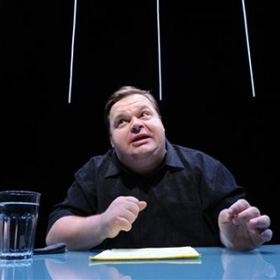The Agony And Ecstasy Of Steve Jobs

4.5/5
When Steve Jobs, beloved tech-god and idolized business mogul, died last October following a protracted battle with pancreatic cancer, satirical news outlet The Onion ran with the head: “Last American Who Knew What The F— He Was Doing Dies.” In these turbulent, trying economic times, when the very idea of the American Dream itself seemed under siege and on the verge of collapse, Steve Jobs stood tall as a testament to the notion that if you simply married innovation with hard work then the world would be your oyster.
Author and monologist, Mike Daisey, however, has a different idea. A self-confessed obsessive lover and devourer of all things silicone, and a self-described “Apple Afficionado,” Daisey is one of the few people to have peeled back the curtain on the wizard, so to speak – having traveled first hand to the manufacturing plant in China where Apple gizmos are made – offering a contrarian’s view that the Emperor has no clothes.
For his latest monologue, pointedly titled The Agony and Ecstasy of Steve Jobs, Daisey, a stout, rotund fellow, adopts a typically no frills approach utilizing a desk, a chair, a glass of water, and a stack of simple notes to make his point. From this fixed vantage he works to both inform and transform audience opinion of the little gadgets that have become such an intricate part of our everyday lives that we can barely function in their absence anymore. The ecstasy of which Daisey speaks involves his detailed recollections of his personal, lifelong love affair with Apple with misty-eyed reverence – offering up particular affection for the sleek, minimalist design that has become the company standard (‘Nano’ is smaller than ‘Mini’).
From there he segues into the agony as he recounts his entirely accidental discovery of some test photos of an iphone camera taken at the gigantic, sprawling Foxconn plant in the city of Shenzhen, China – home to some 470,000 live-in workers who collectively manufacture approximately 49% of all consumer electronics made in the world today. The photos stirred something deep inside of Daisey and soon he found himself wondering where these gadgets, which had been the great joy of his life, actually come from. A plane journey to China and a quick look at the nets adorning the roofs of the Foxconn complex to catch the suicide jumpers and he had his answer.
Speaking at the gates pf the plant, under the watchful eye of the guards with the guns, Daisey heard firsthand from the workers – some as young as twelve – of the eighteen hour days and the ruined limbs brought about by of years of monotonous, uninterrupted, repetitive motion. Through a combination of matter-of-fact delivery, gallows humor, and pointed imagery conjured by the author – whose performance has an air of Lewis Black about it – he details a series of harsh inhumane truths that at once demolish the fabled image of jobs as some kind of benevolent hippie merely disguised as a mogul.
It’s a reality that is as distasteful as it is true, that Apple, it’s tens of millions of customers, and the rest of the world either doesn’t know about, or more likely simply does not care to consider; a small price to pay for the convenience of being able to Google stuff idly on the toilet. It’s a devastatingly effective show – as much a confessional as anything else. But still, even as Daisey empowers the audience through information it’s hard to feel much beyond a melancholic sense of helplessness as you exit the theater. Even as Daisey goes to the trouble of pointing you to the appropriate inbox, should you wish to make your own view on the metter heard, Apple currently has more cash on reserve than the US Federal Government and the demands on the slave laborers of the Foxconn employees to do more with less are only increasing every day.
RELATED ARTICLES
Get the most-revealing celebrity conversations with the uInterview podcast!





Leave a comment